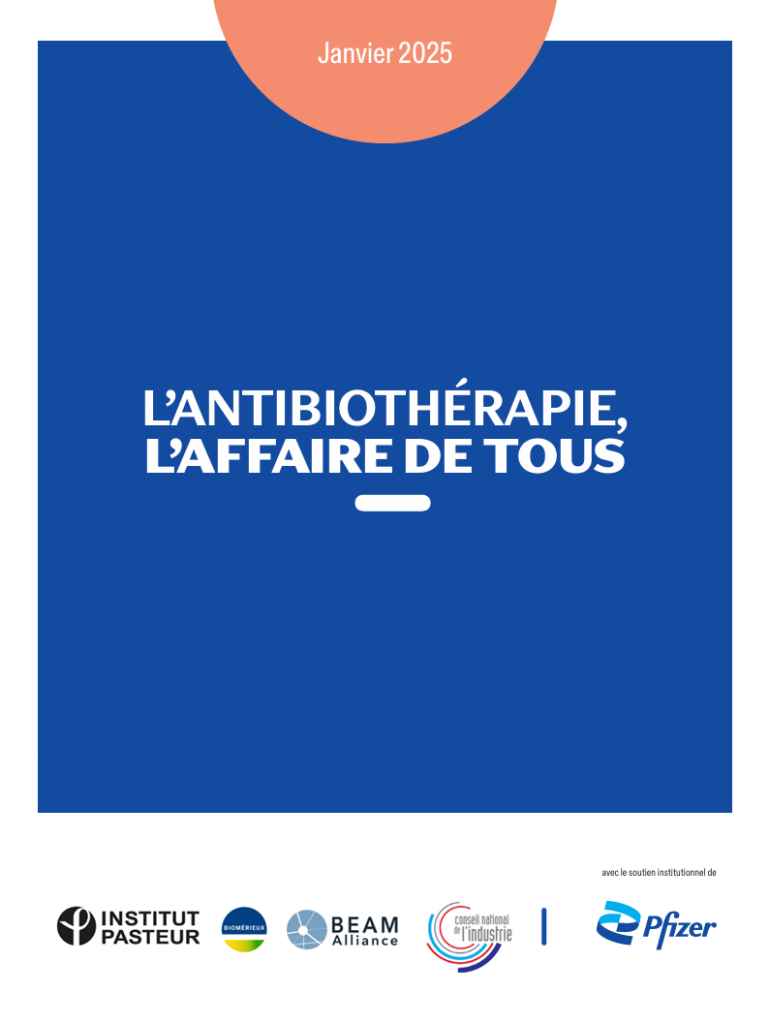The rise in antimicrobial resistance is an increasingly critical public health issue worldwide. It requires the mobilisation of various public and private players in the healthcare sector. Among them, pharmaceutical companies such as Pfizer have been involved for years in the fight against antimicrobial resistance and are calling for the necessary changes at various levels.
Antibiotic therapy is everyone’s business! This is the premise that the laboratory’s French subsidiary, chaired by Reda Guiha, wants to impress on the general public. It is also the title of a white paper that Pfizer has produced in partnership with the Institut Pasteur, Biomérieux, BEAM Alliance and the industry’s Strategic Committee. This white paper is the fruit of a process of reflection initiated by Pfizer in 2024, during a conference-debate followed by a short-lived think tank on the critical issues of antimicrobial resistance and the importance of innovation in antibiotic therapy.
They brought together experts from different fields to discuss current challenges, and consider possible strategies and solutions. This editorial looks at the issues that came to the fore, from education and awareness-raising to the appropriate use of antibiotics, and the importance of coordinated public policies to support research and the development of new therapies.

White paper: ‘Antibiotic therapy: everyone’s business’.
Antibiotic resistance, a major public health challenge we need to tackle together
Antibiotic resistance is one of the greatest public health challenges facing the world today. An estimated 1.3 million people die each year as a direct result of antibiotic-resistant infections, with a further 4.9 million indirect deaths. In France, there are 4,500 direct deaths a year, and this figure could rise to 238,000 by 2050 if nothing is done.
Faced with this growing threat, there is an urgent need for action. Yet the development of new antibiotics is extremely slow, accounting for just 2.5% of global pharmaceutical R&D, compared with 38% for oncology. The low priority given to R&D in antibiotic therapy is mainly due to the low profitability of new antibiotics, which are generally used for short periods and often reserved for last-resort treatment, in order to preserve their efficacy. This results in low sales volumes, particularly for niche indications.
‘To meet this challenge, a global and coordinated approach is needed, combining prevention, responsible antibiotic management, innovation and new financing models,’ says Reda Guiha, President of Pfizer in France. “This is a battle that we must wage together: healthcare professionals, political decision-makers, industry and the general public.
Raising awareness to prevent antimicrobial resistance
The first challenge is to make society as a whole aware of the crucial importance of preserving the effectiveness of antibiotics. This begins with communication campaigns aimed at the general public to promote more responsible use of antibiotics and reduce their use, in particular by encouraging vaccination to prevent bacterial and viral infections.
We also need to step up ongoing training for healthcare professionals – pharmacists and doctors – in good prescribing and infection control practices.
On an individual level, everyone has a role to play. Patients need to understand that they do not need to systematically demand a prescription for antibiotics from their doctor, and sometimes accept alternatives such as rest or symptomatic treatment. For their part, healthcare professionals should systematically encourage the use of rapid diagnostic tests before prescribing antibiotics, to ensure that treatment is necessary.
In health care establishments, it is essential to implement infection prevention and control programmes, whether by reinforcing hygiene measures, training healthcare staff or closely monitoring antibiotic consumption.
- Lastly, Reda Guiha stresses the need for greater international coordination, which seems to be a key factor in sharing best practice and harmonising policies in the fight against antibiotic resistance: ‘This is a battle we need to wage together, at both local and global level’.
Investing in research and development for new solutions
The second major challenge is to invest massively in the research and development of new therapeutic solutions, in order to guarantee the effectiveness of treatments in the face of the growing threat of antimicrobial resistance.
Despite the urgency of the situation, the R&D pipeline for antibiotics remains insufficient. It is therefore vital to stimulate innovation in this field, by mobilising more public and private funding and encouraging ambitious partnerships between academic research, the pharmaceutical industry and health authorities.
In addition to antibiotics, we also need to support the development of new therapeutic approaches, such as alternatives to antibiotics (phagotherapy, targeted therapies, etc.) and rapid diagnostics for more targeted prescriptions. The aim is to diversify our therapeutic arsenal to better respond to the constant evolution of bacteria.
Finally, existing antibiotics need to be improved, by regularly reassessing their place in the therapeutic armoury in the face of the emergence of new resistance. This will ensure that our current treatments remain effective for as long as possible.
Rethinking funding models for sustainable development
The third key issue is the introduction of innovative and sustainable funding models. In particular, France and the European Union must be encouraged to introduce a coherent funding model based on separating the price of antibiotics from the volume sold. The aim is to decouple the remuneration of pharmaceutical laboratories from the quantity of antibiotics sold, in order to encourage the development of new molecules, while preserving their proper use.
The experts also agree on the need to raise the price of mature antibiotics, in order to keep them on the market and to incorporate the dimension of future public health risk into the assessment carried out by the French National Authority for Health (HAS). By including this aspect, the assessment would not be limited to immediate clinical effectiveness, but would also take into account the potential impact on public health in the long term.
In addition, facilitating the inclusion of antibiotics on the ‘liste en sus’ [1] is essential to guarantee rapid and equitable access to these drugs, whatever their level of evaluation, while encouraging innovation in their development.
Adapting the packaging to the exact duration of the treatment prescribed is also a measure to be considered, to avoid waste and shortages, but also to prevent antibiotic resistance, as the reuse of unused antibiotics, in a setting not supervised by a doctor, is a common practice among users.
Finally, the creation of an infectious diseases committee at the European Medicines Agency (EMA) and the granting of specific status to antibiotics, similar to that of orphan drugs, would be additional levers.
- Reda Guiha concludes with these words: “Only a comprehensive and coordinated approach, combining prevention, innovation and new financing models, will enable us to successfully meet the challenge of antibiotic resistance. It’s a constant battle that requires the commitment of all players in society.”
Let’s work together to preserve the effectiveness of our anti-infectives and protect everyone’s health. This is the challenge of a large-scale collective action, commensurate with the health emergency represented by antimicrobial resistance.
Author

Reda Guiha
Président Pfizer France